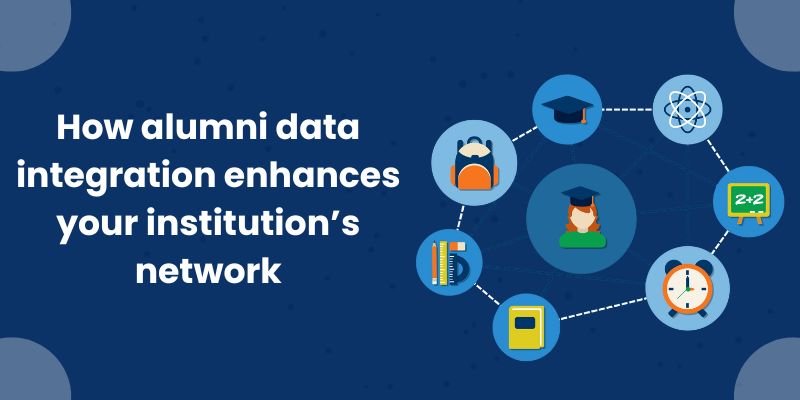In the digital age, educational institutions are increasingly turning to data-driven strategies to foster engagement and build long-lasting relationships with their communities. One of the most powerful but often under utilized resources in this space is alumni data. When integrated effectively into your ERP or school management software, alumni data can transform how your institution builds its network, supports current students, and creates value across generations.
In this blog, we explore how alumni data integration enhances institutional networks and why it is a critical part of digital transformation in education.
The Importance of Alumni Networks in Education Via ERP
Alumni represent more than just past students—they are ambassadors, mentors, potential donors, and lifelong community members. A strong alumni network can:
- Enhance the reputation of your institution
- Provide career guidance and opportunities for current students
- Open doors to partnerships, sponsorships, and collaborations
- Contribute to fundraising efforts and infrastructure development
- Foster a sense of continuity and pride
However, to tap into this potential, institutions need an efficient and centralised way to manage alumni data.
What is Alumni Data Integration?
Alumni data integration refers to the process of incorporating past student records into your existing digital infrastructure—particularly your ERP system. This can include:
- Contact details
- Academic records
- Employment history
- Areas of interest
- Engagement level (event participation, donations, etc.)
By housing this data in the same ecosystem that manages student information, finance, communication, and HR, institutions gain a 360-degree view of their entire community.
This kind of integration is especially valuable when implemented through modern education ERP systems that allow seamless data flow and accessibility.
Key Benefits of Alumni Data Integration
1. Strengthening Engagement and Communication
Alumni engagement often suffers due to lack of updated contact information and fragmented communication strategies. ERP-integrated data allows institutions to:
- Segment alumni based on location, batch, profession, etc.
- Send targeted newsletters, event invites, and updates
- Track communication history and interactions
- Automate reminders for reunions or campaigns
Personalised communication builds stronger bonds and increases the likelihood of participation.
2. Supporting Career Services and Mentorship Programs
Alumni who have navigated higher education and employment are in a great position to mentor current students. With an integrated alumni database, institutions can:
- Identify potential mentors based on industry and experience
- Facilitate internship and job referrals
- Organise virtual and in-person mentoring sessions
- Create role model case studies to inspire students
This makes alumni a living resource that strengthens student outcomes and enhances your institution’s academic support systems.
3. Enhancing Fundraising Campaigns
Philanthropic contributions from alumni play a major role in infrastructure development, scholarships, and innovation funds. Integrated data helps:
- Identify high-potential donors
- Analyse past giving behaviour
- Tailor fundraising messages to align with interests
- Measure the effectiveness of donation drives
When institutions demonstrate impact, alumni are more likely to give back—financially and otherwise.
4. Promoting Institutional Branding
Success stories of alumni contribute immensely to brand reputation. Through integrated data, institutions can:
- Highlight alumni achievements on social media and websites
- Involve alumni in admission campaigns or webinars
- Use testimonials to build trust with prospective parents and students
- Leverage alumni in industry partnerships and conferences
This strengthens brand identity and keeps the institution in the public eye.
5. Building a Culture of Lifelong Learning
An integrated approach allows institutions to keep alumni informed about continuing education programs, certifications, and short courses. This keeps the alumni ecosystem active and engaged long after graduation.
Institutions can even offer exclusive alumni access to resources like the library, faculty consultations, or career services—building goodwill and encouraging return enrolments.
How ERP Systems Enable Effective Alumni Data Integration
Modern school ERP software and college ERP platforms are designed with modular capabilities. Alumni management can be added as a dedicated module that links directly to admissions, academics, finance, and communication tools.
Here’s how ERP makes alumni data integration seamless:
- Centralised Database: No more scattered spreadsheets or manual tracking
- Real-Time Updates: Alumni can update their profiles through self-service portals
- Data Security: Robust protocols ensure sensitive information remains protected
- Analytics and Reporting: Institutions can generate reports to monitor engagement, campaign ROI, and geographic distribution
- Event Management: Plan, promote, and track alumni events with built-in tools
For institutions aiming to future-proof their operations, digital transformation in education must include alumni engagement strategies powered by ERP.
Best Practices for Alumni Data Integration
To make the most of ERP-enabled alumni integration, institutions should:
- Start collecting alumni data early (during final year)
- Offer incentives for updating profiles (certificates, event access)
- Keep communication channels two-way—listen to alumni feedback
- Create an alumni advisory board to support strategy and outreach
- Conduct regular data audits to ensure information accuracy
A Tool for Institutional Memory and Growth
Alumni data isn’t just about past relationships—it’s about building a future-facing institution. When integrated into the core digital infrastructure, this data becomes part of the institution’s memory, offering insights into trends, success metrics, and engagement models that work.
It also supports continuity, especially in times of leadership transition. With an ERP system housing the entire alumni ecosystem, new staff can pick up where their predecessors left off without losing momentum or context.
In an increasingly competitive educational landscape, the strength of your alumni network can set your institution apart. But that strength comes from strategy, and strategy comes from data.
Alumni data integration through ERP is not just an operational convenience—it is a strategic imperative. From branding and mentorship to fundraising and institutional memory, the benefits span across academic and administrative domains.
Investing in alumni data integration today means investing in a more connected, empowered, and successful institutional community tomorrow.
